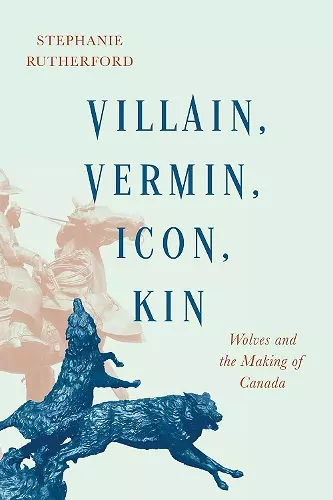Villain, Vermin, Icon, Kin
Wolves and the Making of Canada
Format:Hardback
Publisher:McGill-Queen's University Press
Published:15th May '22
Currently unavailable, our supplier has not provided us a restock date
This hardback is available in another edition too:
- Paperback£31.00(9780228011088)

How relationships with wolves shaped a nation.
Wolves have always captured the human imagination. In sketching out the historical connections people have had with wolves, this book contends that the role in which wolves have been cast – monster or hero – has changed dramatically and offers a model for more ethical ways of interacting with animals in the face of a global biodiversity crisis.
A wolf’s howl is felt in the body. Frightening and compelling, incomprehensible or entirely knowable, it is a sound that may be heard as threat or invitation but leaves no listener unaffected.
Toothsome fiends, interfering pests, or creatures wild and free, wolves have been at the heart of Canada’s national story since long before Confederation. Villain, Vermin, Icon, Kin contends that the role in which wolves have been cast – monster or hero – has changed dramatically through time. Exploring the social history of wolves in Canada, Stephanie Rutherford weaves an innovative tapestry from the varied threads of historical and contemporary texts, ideas, and practices in human-wolf relations, from provincial bounties to Farley Mowat’s iconic Never Cry Wolf. These examples reveal that Canada was made, in part, through relationships with nonhuman animals.
Wolves have always captured the human imagination. In sketching out the connections people have had with wolves at different times, Villain, Vermin, Icon, Kin offers a model for more ethical ways of interacting with animals in the face of a global biodiversity crisis.
“Rutherford’s broader argument remains compelling: anthropocentric attitudes lie at the heart of modern biopolitical power, and the persistence of wolves in the face of our attempts to exterminate them exposes the fiction that we can control nature itself. It’s an arrogance that brings to mind Margaret Atwood’s poem “Progressive Insanities of a Pioneer,” from 1968, in which the character of the title belittles the wilderness as “the absence of order” rather than recognizing it for what it really is: “an ordered absence.” Villain, Vermin, Icon, Kin highlights the danger of this type of thinking and … makes the case that something must be done to change it, lest we march so far down our current path of environmental destruction that, as one maligned wolf once put it, all of our houses get blown down.” Literary Review of Canada
“Stephanie Rutherford brilliantly maps the fraught, contested geographies of settler-colonial power structuring human-wolf relations in Canada. Rutherford’s wide-ranging archive reframes Canada as a disputed landscape shaped by deadly colonial wills to power, Indigenous resistances to political and epistemic erasure, and complex and surprising forms of wolf agency. With depth, rigor and humor, Villain, Vermin, Icon, Kin is a remarkable interdisciplinary contribution and should compel attention from a broader readership in and outside the academy.” Emotion, Space and Society
- Winner of the Federation for the Humanities and Social Sciences 2024 Canada Prizes
ISBN: 9780228011071
Dimensions: unknown
Weight: unknown